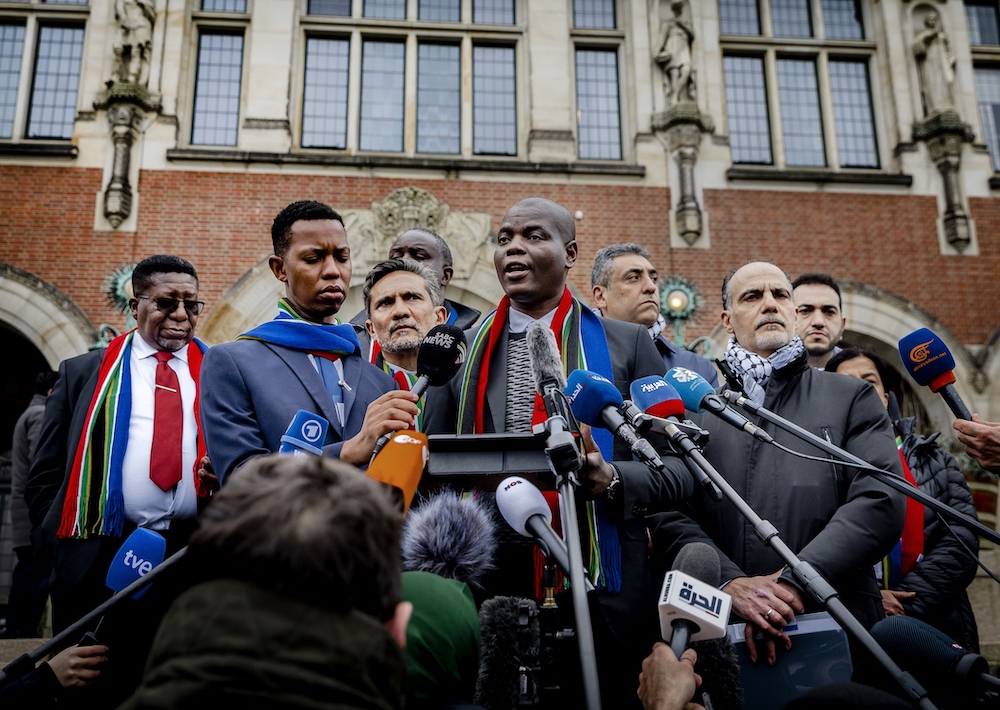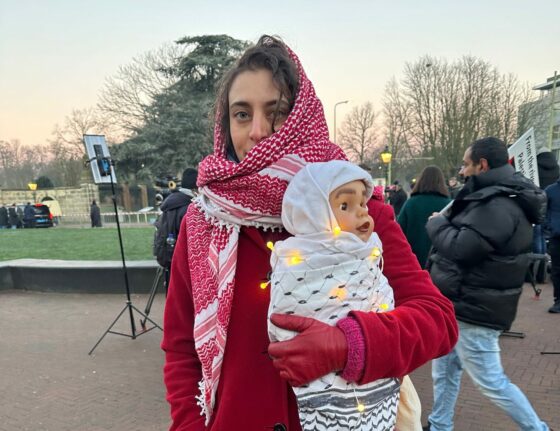Top UN court opens South Africa’s genocide case against Israel
Lauren Comiteau
Two days of public hearings in South Africa’s genocide case against Israel opened at the World Court Thursday, where South Africa asked judges at the UN’s highest judicial body to issue an emergency court order to stop Israel’s military campaign in Gaza.
Hundreds of pro-Palestinian and pro-Israeli protestors demonstrated outside the Peace Palace, home of the International Court of Justice, but their chants could be heard all the way in court as South Africa argued that Israel’s actions in Gaza amount to genocide.
Lawyer Adila Hassim told judges that Israel has demonstrated a pattern of genocidal conduct that includes mass killings, inflicting serious bodily and mental harm and the destruction of Palestinian life via starvation and hunger, blocking humanitarian aid and the forced displacement and evacuation of Gaza’s Palestinians.
“That order alone was genocidal,” she said, referring to Israel’s first evacuation notice to Palestinians on October 13.
South Africa has accused Israel of breaching its obligations under the 1948 Genocide Convention—established after the Holocaust—making it a crime to intentionally destroy a people based on their ethnicity, nationality or race. South Africa argues that is exactly what Israel is doing—that by destroying Palestinians in Gaza, they are intentionally wiping out a part of the Palestinian community.
South Africa’s lawyers don’t have to prove genocide is being committed, just that there is enough evidence to show that some of Israel’s acts fall under the Convention’s provisions and that genocide is plausible. If judges don’t order an immediate halt to the bombing, they argue, irreparable harm will be done before any case on the merits has a chance to be heard.
“Nothing will stop the suffering except an order from this court,” said Adila Hassim.
Israel’s war in Gaza followed the October 7 attack by Hamas, when its fighters stormed through several communities in Israel and killed some 1,200 people, mainly civilians. They abducted around 250 others, nearly half of whom are still being held.

But Ronald Lamola, South Africa’s minister of justice, told judges that no armed attack justifies Israeli’s actions, which he says are the culmination of decades of oppression and occupation.
“The violence and the destruction in Palestine and Israel did not begin on October 7, 2023. The Palestinians have experienced systematic oppression and violence for the last 76 years,” he said.
South African lawyers also pointed out what they called the “genocidal rhetoric” that comes from Israel’s political and military leaders and trickles all the way down to its soldiers on the ground—rhetoric that they shows the necessary intention to commit genocide.
State policy
“Statements made by state officials communicated state policy,” said lawyer Tembeka Ngcukaitobi, who showed a video of a speech by Israeli Prime Minister Benjamin Netanyahu and cited statement’s by the country’s Knesset.
He also played what he called “snuff films” of Israeli soldiers blowing up Palestinian houses and villages and other soldiers singing songs with the words “no uninvolved civilians” from the Gaza front.
South African lawyers argue that the failure to condemn, prevent or punish genocide is also a violation of the Genocide Convention.
Israel calls the charges baseless and says South Africa is distorting reality. It will get to defend itself in court Friday when its own team of high-profile lawyers make their case.
Thank you for donating to DutchNews.nl.
We could not provide the Dutch News service, and keep it free of charge, without the generous support of our readers. Your donations allow us to report on issues you tell us matter, and provide you with a summary of the most important Dutch news each day.
Make a donation